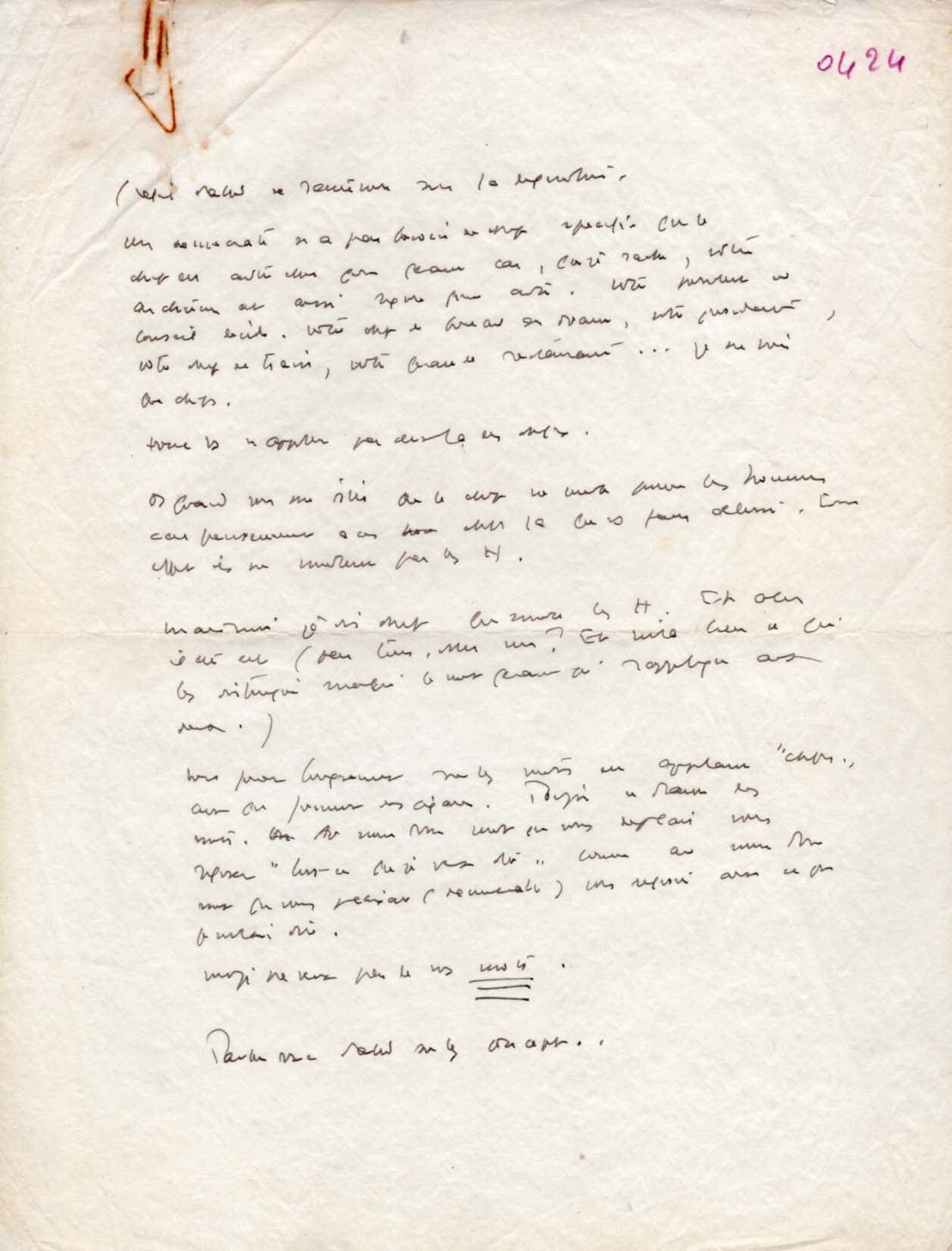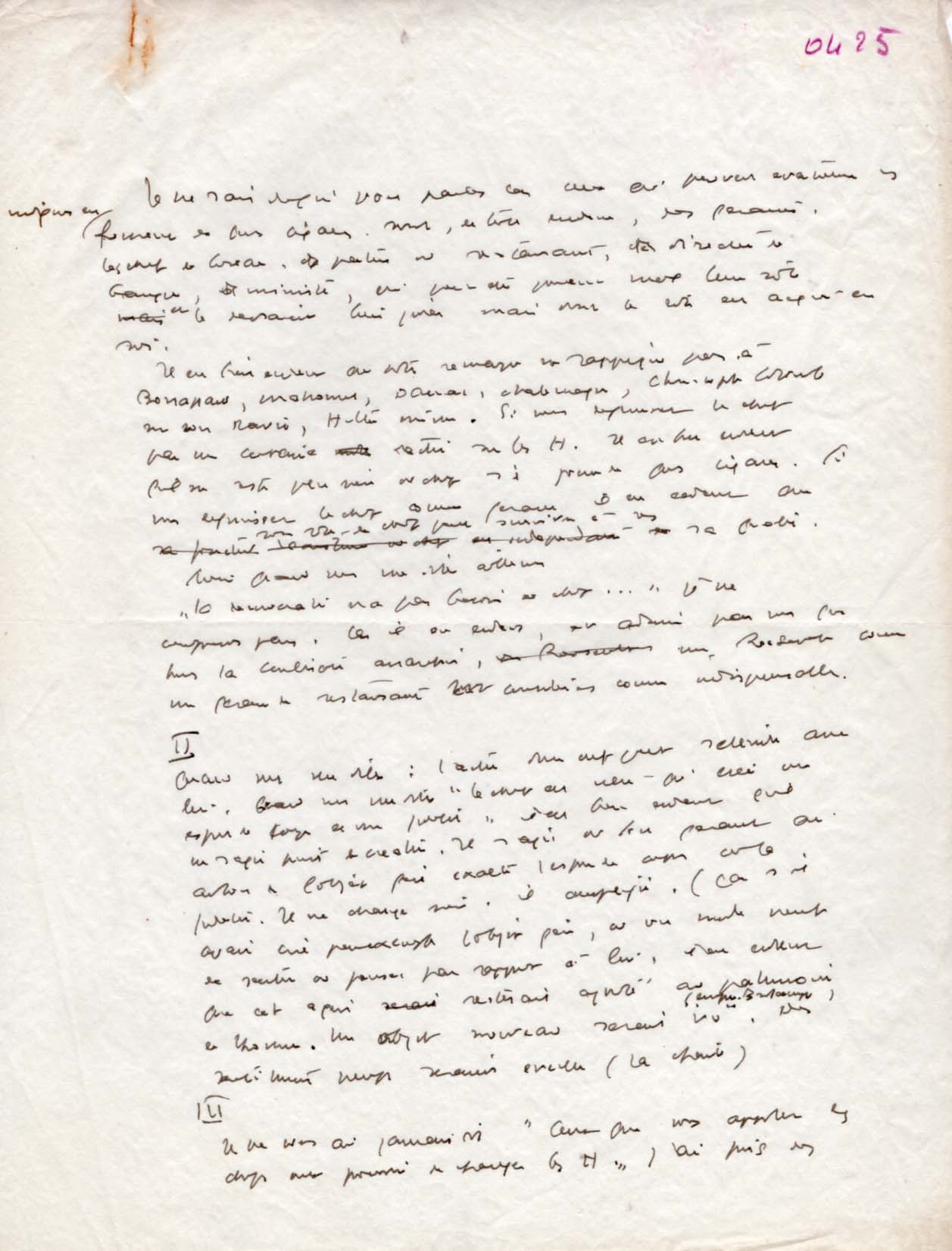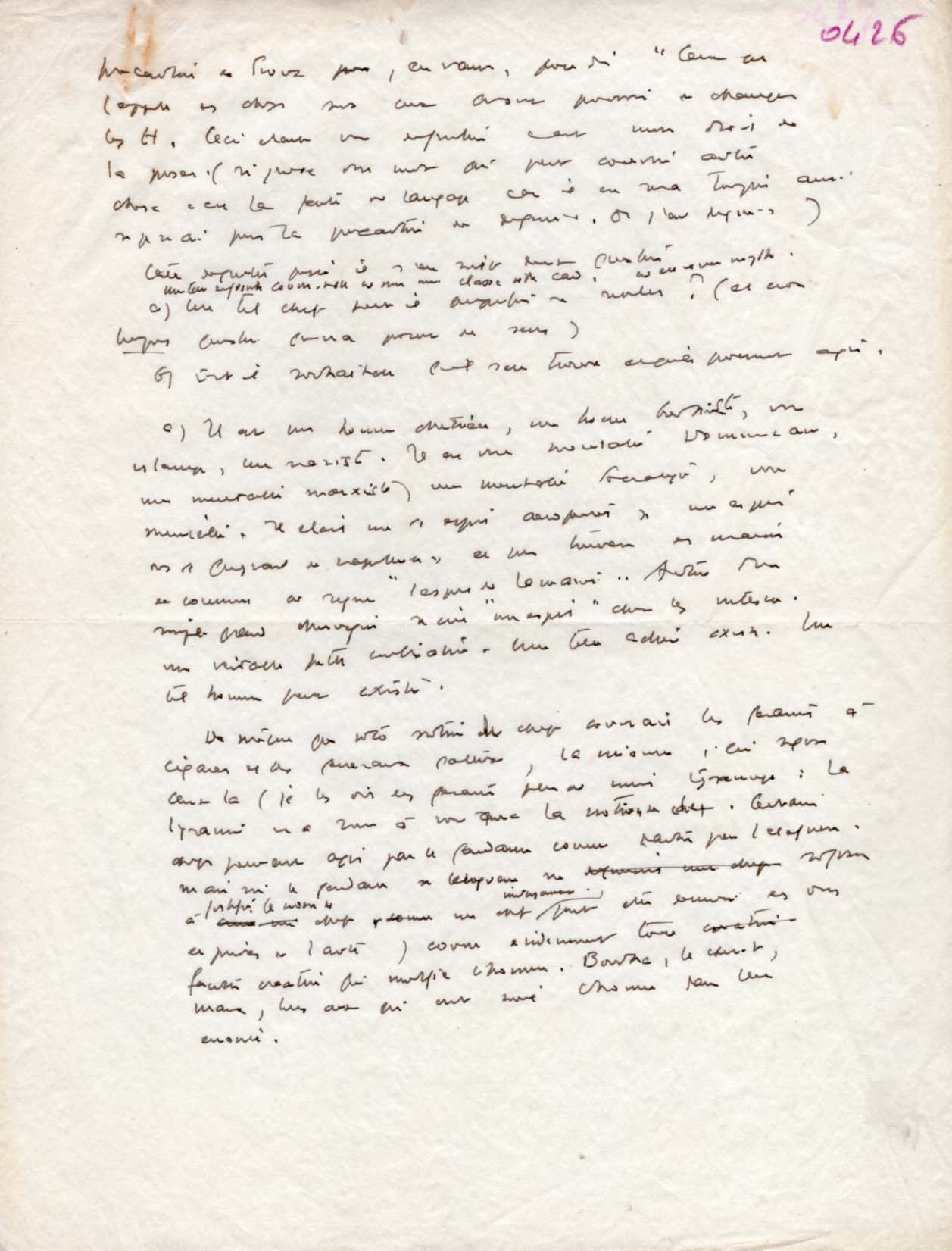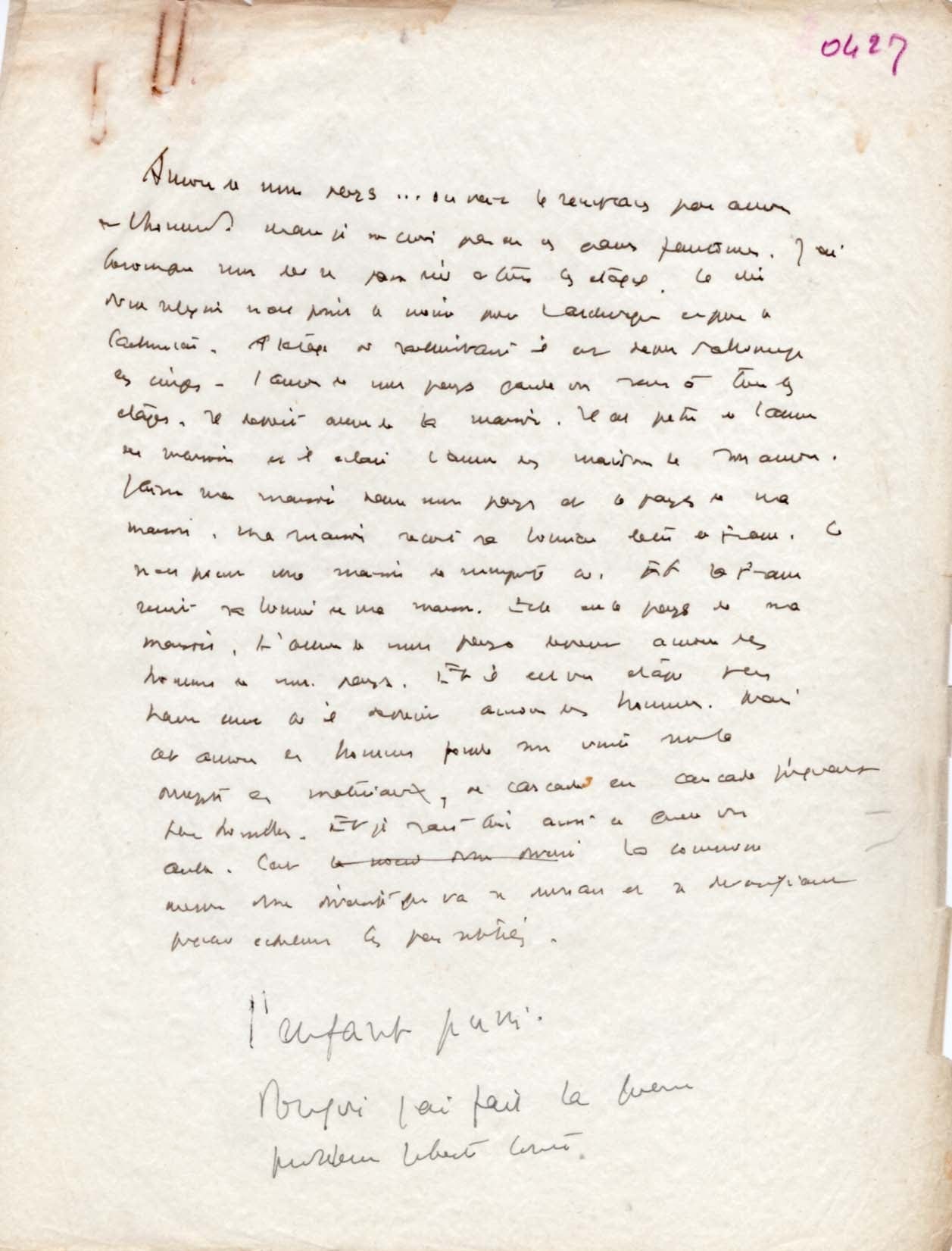Description
Autograph manuscript, four pages (on the front on watermarked American carbonless paper `Esquire Onion Skin`) - numbered in purple pencil `0424`-`0427`, 8,5 x 11 inch, about 1940, in French, manuscript on the leader in society, written in black ink, with paperclip remnants to the upper left corner, mild creasing, and signs of wear to the edges - in fine condition.
The author develops the same concept of the leader/chef as in `La Morale de la pente` (Pléiade, II, p. 29-30), but with a very different development. Here, it is a text in the form of a response to the place and role of the leader in the military hierarchy and by extension in human and social society. As in `La Morale de la pente`, the author begins by defining what a leader should be. He denounces the stereotypical, conventional image of these men, leaders, ministers, managers, etc. smoking big cigars. Once the definition of chef has been established, Saint-Exupéry wonders if it is not a myth. “Is it desirable that there be some and that they can act?" (translated) For him, the absolute level of the leader, if it exists, is linked to History, whether it is Buddha, Christ or Marx, who through their creative ideas saved Man. The last page is the poetic meditation of a man far from his country, his home, his loves.
In parts:
"S'agit d'abord de s'entendre sur la définition.
Une démocratie n'a pas besoin de chef spécifique. Le chef est autre chose qu'un gérant car, que je sache, votre architecte est aussi rigide qu'un autre. Votre président du conseil décide. Votre chef de bureau des douanes, votre président, votre chef de train, votre gérant de restaurant… Je ne vois que chefs. Donc vous n'appelez pas ceux-là des chefs.
Vous jouez bougrement sur les mots en appelant "chefs" ceux qui fument des cigares. Toujours le drame des mots. Au nom d'un mot qui vous déplaît vous refusez "tout ce que je veux dire" comme au nom d'un mot qui vous plaisait (démocratie) vous refusiez aussi ce que je voulais dire. Moi je ne veux plus de vos mots.
Parlons donc d'abord sur les concepts. /
Je ne sais pas de qui vous parlez car ceux qui peuvent éventuellement nous […] en fumant de gros cigares, sont, de toute évidence, des gérants. Les chefs de bureau, les directeurs de banque, les ministres, qui peut-être jouent mal leur rôle et le devraient bien jouer mais dont le rôle est acquis en soi.
Il est bien évident que votre remarque ne s'applique pas à Bonaparte, Mahomet, Daurat, Charlemagne, Christophe Colomb sur son navire, Hitler même, […] il est évident qu'il ne reste plus rien du chef s'il fume de gros cigares. […]
"la démocratie n'a pas besoin de chef…" je ne comprends pas. Car il est évident, et admis par tous que hors la civilisation anarchiste, un Roosevelt comme un gérant de restaurant sont considérés comme indispensables.
II. Quand vous me dites: l'action d'un chef peut s'éteindre avec lui. Quand vous me dites "le chef est celui qui crée un esprit de corps et une fidélité" il est bien évident qu'il ne s'agit point de création. Il s'agit du bon gérant qui autour de l'objet géré exalte l'esprit de corps ou la fidélité. Il ne change rien. Il amplifie. (car s'il avait créé par exemple l'objet géré, ou un monde neuf de sentir ou penser par rapport à lui, il est évident que cet acquis resterait ajouté au patrimoine de l'homme. Un objet nouveau serait vu. Des sentiments neufs seraient éveillés (la charité).
III. Je ne vous ai jamais dit "ceux que vous appelez les chefs ont pouvoir de changer les hommes." J'ai pris des précautions de sioux, en vain, pour dire "Ceux que j'appelle des chefs sont ceux qui ont pouvoir de changer les hommes. Ceci étant une définition, c'est mon droit de la poser. (si j'use d'un mot qui peut couvrir autre chose c'est la faute du langage car il en sera toujours ainsi si je n'ai pris la précaution de définir. Or j'ai défini…)
Cette définition posée il s'en suit deux questions [...].
a) un tel chef peut-il quelquefois se sentir ou est-ce un mythe ? (et non toujours question qui n'a point de sens)
b) est-il souhaitable qu'il s'en trouve et qu'ils puissent agir.
c) Il est un homme chrétien, un homme bouddhiste, un islamique, un naziste. Il est une mentalité dominicaine, une mentalité marxiste, une mentalité socratique […] Il était un " esprit aéropostal", […] et pour trouver des maisons de commerce où règne "l'esprit de la maison"… Autour d'un simple grand chirurgien se crée "un esprit" chez les internes. Une véritable petite civilisation. Un tel homme peut exister.
De même que votre […] du chef couvrait les gérants à cigare et les gérants gâteux, la mienne, qui refuse ceux-là (je le dis des gérants plus ou moins tyranniques : la tyrannie n'a rien à voir avec la notion de chef. Certains chefs peuvent agir par le gendarme comme d'autres par l'éloquence. Mais ni le gendarme ni l'éloquence ne suffisent à justifier le nom de chef, un chef peut être démuni des uns et privé de l'autre) comme évidemment toute faculté créatrice qui modifie l'homme. Bouddha, le Christ, Marx, tous ceux qui ont sauvé l'homme par leur énoncé. /
Amour de mon pays… Où vais-je le remplacer par amour de l'Homme ? Mais je ne crois pas en ces grands fantômes. […] Le dieu d'une religion n'est point le même pour l'archevêque et pour le sacristain. A l'étage du sacristain il est devoir d'allumage des cierges. L'amour de mon pays garde un sens à tous les étages. Il devient amour de la maison. Il est pétri de l'amour des maisons et il éclaire l'amour des maisons de mon amour. J'aime ma maison dans mon pays et le pays de ma maison. Ma maison reçoit sa lumière d'être de France. Ce n'est point une maison de n'importe où. Et la France reçoit sa lumière de ma maison. Elle est le pays de ma maison. L'amour de mon pays devient amour des hommes de mon pays. Et il est un étage plus haut encore où il devient amour des hommes. Mais cet amour des hommes fonde son unité sur la diversité des matériaux, de cascade en cascade [...]"
Translated:
"The first thing is to agree on the definition.
A democracy does not need a specific leader. The boss is something other than a manager because, as far as I know, your architect is as rigid as any other. Your board chair decides. Your head of customs office, your president, your train conductor, your restaurant manager… I only see chefs. So you don't call these leaders.
You're playing with words a lot by calling those who smoke cigars "chiefs." Always the drama of words. In the name of a word that you don't like, you refuse "everything I want to say" just as in the name of a word that you like (democracy) you also refuse what I want to say. I don't want your words anymore. So let's talk about concepts first. /
I don't know who you are talking about because those who can possibly […] by smoking big cigars are, obviously, managers. The heads of office, the bank directors, the ministers, who perhaps play their role poorly and should play it well but whose role is acquired in itself.
It is very obvious that your remark does not apply to Bonaparte, Mahomet, Daurat, Charlemagne, Christopher Columbus on his ship, Hitler even, […] it is obvious that there is nothing left of the leader if he smokes big cigars. […]
“democracy does not need a leader…” I don’t understand. Because it is obvious, and accepted by all, that outside of anarchist civilization, a Roosevelt like a restaurant manager are considered indispensable.
II. When you tell me “the action of a leader can die with him”. When you tell me “the leader is the one who creates an esprit de corps and loyalty” it is very obvious that it is not a question of creation. It is about the good manager who around the managed object exalts team spirit or loyalty. It doesn't change anything. It amplifies. (because if he had created, for example, the managed object, or a new world of feeling or thinking in relation to it, it is obvious that this achievement would remain added to the heritage of man. A new object would be seen. New feelings would be awakened (charity)."
III. I never told you “those you call leaders have the power to change men. “I took Sioux precautions, in vain, to say “those whom I call leaders are those who have the power to change men. This being a definition, it is my right to pose it. (if I use a word which can cover something else it is the fault of language because it will always be like this if I have not taken the precaution to define. But I defined…)
This definition posed, two questions follow.
a) can such a leader sometimes feel himself or is it a myth? (and not always a question which has no meaning)
b) is it desirable that there are some and that they can act.
c) He is a Christian man, a Buddhist man, an Islamic man, a Nazi. He is a Dominican mentality, a Marxist mentality, a Socratic mentality […] He was an “airmail spirit”, […] and to find commercial houses where "the spirit of the house" reigns... Around a simple great surgeon a "spirit" is created among the interns. A real little civilization. Such a man can exist.
Just as your […] of the boss covered the cigar managers and the doting managers, mine, which refuses those (I say more or less tyrannical managers: tyranny has nothing to do with the notion of chief. Certain chiefs can act through the gendarme like others through eloquence. But neither the gendarme nor the eloquence are enough to justify the name of chief, a leader can be deprived of the one and deprived of the other) as obviously any creative faculty which modifies man. Buddha, Christ, Marx, all those who saved man by their words.
Love of my country… Where am I going to replace it with love of Man? But I do not believe in these great ghosts. […] The god of a religion is not the same for the archbishop and for the sacristan. On the sacristan's floor it is the duty of lighting the candles. The love of my country retains meaning on all floors. It becomes love of the house. It is steeped in the love of houses and it enlightens the love of the houses of my love. I love my house in my country and the country of my house. My house receives its light from being from France. It is not a house from just anywhere. And France receives its light from my house. It is the country of my house. The love of my country becomes love of the men of my country. And there is an even higher level where it becomes love of men. But this love of men bases its unity on the diversity of materials, from cascade to cascade [...]"
Plus d'informations sur la personne
Profession:
(1900-1944) French author & pioneering aviator - best remembered for `The Little Prince` & `Wind, Sand and Stars`.
Year of Birth: 1900
Certificat d'authenticité
Toutes nos pièces sont vendues avec un certificat d'authenticité. Si une pièce se révèle être erronée ou si vous n'aimez pas un autographe, vous récupérerez votre argent toute une vie.
Paiement et sécurité
Vos informations de paiement sont gérées de manière sécurisée. Nous ne stockons ni ne pouvons récupérer votre numéro de carte bancaire.





